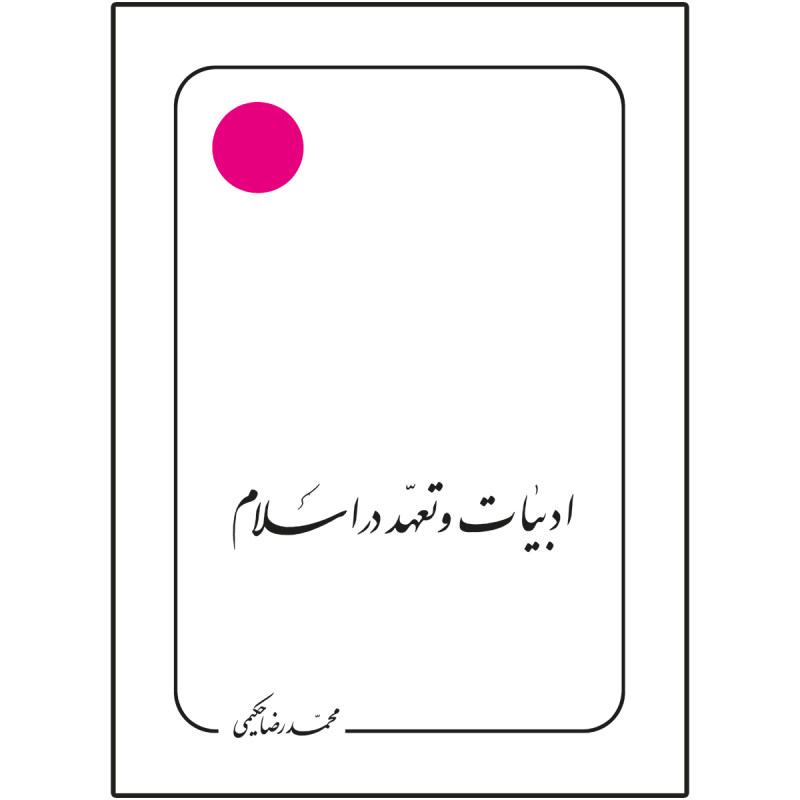Muhammad-Reza Hakimi, Adabiyyat va taʽahhod dar Islam, Tehran, 1356 Sh/ 1977; subsequent reprint and abridged editions by Dalil-e Maa, Qum. 381 pp.
This is a famous book of the late Muhammad-Reza Hakimi (1314-1400 Sh/ 1935-2021) in the realm of Islamic letters. Well-versed in Islamic branches of knowledge first in Mashhad and then in Tehran and Qum, he was deeply informed of both Shii Islamic religious teachings and the then current Western and ex-Communist views in economics and social justice. Shii Islamic social justice has always been one of his chief concerns throughout his life. This serious concern also influenced most of his views.
Hakimi must be one of the few Iranian thinkers who made important divisions in literature. Heavily influenced by his classical and traditional studies in Shii seminaries, he kept constant contact with the Najaf and Karbala Shii dignitaries. The result was a personality who thought about the social influences and effects of Islamic letters on the public for the sake of guidance and building a community outlined in Islamic teachings. He must be amongst the first Iranian writers and thinkers who introduced the concept of ‘literature of commitment’ to the Iranian socio-intellectual context and atmosphere.
The first chapter of the book starts with rhetoric as a natural disposition. It then follows the rhetorical line in the discourses of the Holy Quran and the Infallibles. After that, it gives a rapid survey of rhetoric from the first century of the Islamic calendar down to the present time. According to the book, ‘commitment’ comes between two types of knowledge: knowledge from the past, i.e., what one has learned and wishes to implement it in the future, and knowledge in the future, i.e., the knowledge to be conveyed with expertise to the future generations.
 Amongst the various forms of literature, the book focuses on poetry as a culmination of literary beauty and its effects in conveying concepts to its readership. The book deplores inadequate attention that has been given to poetry in traditional Islamic education, all in contrast to the rich background that has been inherited from the past glorious days. It delves into short accounts of noteworthy poets in the golden days of Islamic history and analyzes some of the poems it quotes. To help the reader, it vocalizes the Arabic poems with their translation into Persian.
Amongst the various forms of literature, the book focuses on poetry as a culmination of literary beauty and its effects in conveying concepts to its readership. The book deplores inadequate attention that has been given to poetry in traditional Islamic education, all in contrast to the rich background that has been inherited from the past glorious days. It delves into short accounts of noteworthy poets in the golden days of Islamic history and analyzes some of the poems it quotes. To help the reader, it vocalizes the Arabic poems with their translation into Persian.
Despite a passage of several decades from its first edition, the examples quoted and the lessons taken and inferred sound both instructive and thought-provoking. Later and subsequent editions show little modifications, although it would have been more desirable to include for analyses fragments from modern Persian and Arabic literatures.
It might have been the first book-length publication that bears the term ‘commitment’ (Persian taʽahhud). In retrospect, the book was written in the days that culminated in the 1979 Islamic Revolution of Iran. At that time certain Leftist thoughts seemed to be in vogue among intellectuals, particularly those trained in the French camp. One might surmise that the phrasing of the same title might imply some connections between the author and those intellectuals. It was factually so, for he was both active and critical of modern thoughts, yet appropriated the terms and concepts that sounded relevant to the ideas he intended to convey.
The book renders short glimpses of certain traditional concepts in Arabo-Persian literary education. Such a choice echoes the author’s education and predilection with those glorious past heights in the realm of literature.
Chapter 8 of the book is devoted to literature of commitment, with examples from Arabic and Persian. To make it more accessible to the Persian-speaking readership, it provides translations of Arabic poems. Here, it focuses on conveying Islamic creeds and history in the poems quoted and elucidated. While Chapter 9 pays attention to non-religio-historical poetry, Chapter 10 takes the reader to the sublime aims to be sought in Islamic literature of commitment, again with Arabic and Persian instances. Contrary to the rest of the book, this chapter contains poems from contemporary Arab and Iranian poets.
It would have made the book more user-/ reader-friendly if a group of dedicated experts would have updated the book. It needs a subject index, too.
Muhammad-Reza Fakhr-Rohani
University of Qum,
Iran
